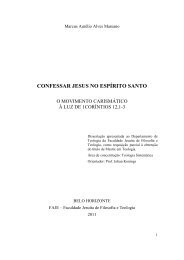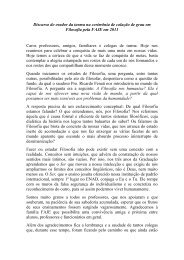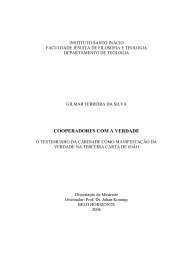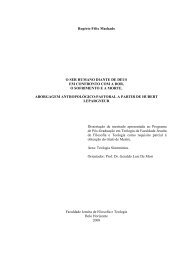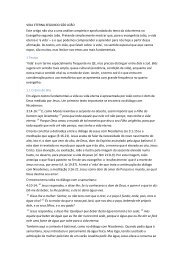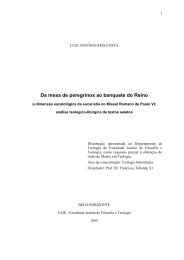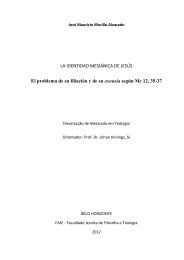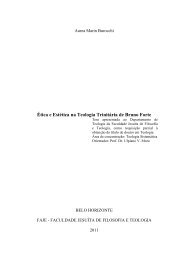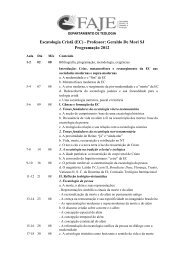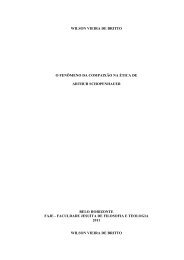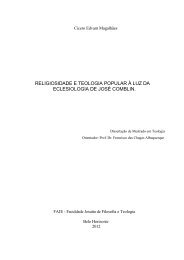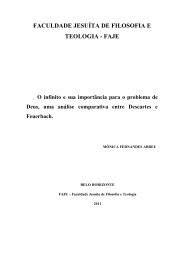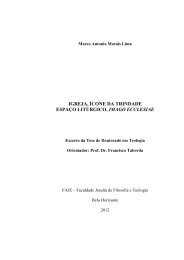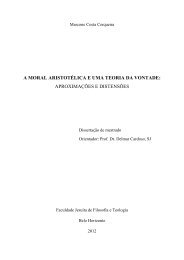o teÃsmo e o problema do mal em richard swinburne - FaJe
o teÃsmo e o problema do mal em richard swinburne - FaJe
o teÃsmo e o problema do mal em richard swinburne - FaJe
Create successful ePaper yourself
Turn your PDF publications into a flip-book with our unique Google optimized e-Paper software.
claramente utilizar a fórmula mais simples, que o valor positivo de G<br />
deve exceder o valor negativo de E. (Alguém pode razoavelmente<br />
considerar que tu<strong>do</strong> o que é requeri<strong>do</strong> é que o valor espera<strong>do</strong> seja<br />
não-negativo, i.e. positivo ou zero. Mas estou colocan<strong>do</strong> o requisito<br />
da forma mais simples, uma vez que a diferença entre zero e um<br />
pequeníssimo valor positivo é tão minúscula que não irá alterar<br />
praticamente nada). 75<br />
O que t<strong>em</strong>os, portanto, é que qualquer ação, <strong>em</strong> geral, representa algum<br />
risco <strong>em</strong> sua execução. Por isso, ponderamos antes de realizá-la, fazen<strong>do</strong> um<br />
cálculo entre os danos e os benefícios que ela representa. Caso os benefícios<br />
sejam maiores, estar<strong>em</strong>os moralmente justifica<strong>do</strong>s <strong>em</strong> tal iniciativa.<br />
Isto explica, segun<strong>do</strong> o autor, tanto o senti<strong>do</strong> das ações como a não<br />
intervenção de Deus nos acontecimentos deste mun<strong>do</strong>. Para ele, Deus<br />
também segue essa lógica, só que de uma maneira incalculavelmente mais<br />
abrangente <strong>do</strong> que a nossa. Ele vê positividades que nós, pela condição<br />
humana, estamos impossibilita<strong>do</strong>s de perceber.<br />
Muni<strong>do</strong>s dessa conceituação, ver<strong>em</strong>os como o <strong>mal</strong> pode comprometer a<br />
hipótese teísta. E, especialmente, que é a partir desse <strong>probl<strong>em</strong>a</strong> que surge<br />
objetivamente a teodicéia de Swinburne.<br />
3.2. Como o <strong>mal</strong> compromete a hipótese teísta<br />
O teísmo, como defendi<strong>do</strong> por Swinburne, é uma hipótese que ganha o<br />
status de hipótese provável pela soma <strong>do</strong>s argumentos <strong>do</strong> tipo C-indutivo. Ele<br />
advoga que, observan<strong>do</strong> os eventos <strong>do</strong> mun<strong>do</strong> e articulan<strong>do</strong>-os uns aos outros,<br />
t<strong>em</strong>-se condições de verificar quão provável é a hipótese de que Deus existe.<br />
Nesse caso, os eventos são muito importantes e não pod<strong>em</strong> ser deixa<strong>do</strong>s de<br />
fora, pois quanto mais eventos for<strong>em</strong> considera<strong>do</strong>s, mais robusta será a soma<br />
e, conseqüent<strong>em</strong>ente, mais consistente o resulta<strong>do</strong>.<br />
75 “The expected value of some action is the sum of the values (positive or negative) of its<br />
possible consequences, each multiplied by the probability of its occurrence if the action is <strong>do</strong>ne.<br />
Anyone who thinks that there are no limits to God's knowledge of the (to us) future actions of<br />
free agents (or consequences of chance processes), can clearly operate with the simpler<br />
formula, that the positive value of G must exceed the negative value of E. (Some may<br />
reasonably hold that all that is required is a non-negative, i.e. positive or zero, expected value.<br />
But I am putting the requir<strong>em</strong>ent in the simpler form, since the difference between zero and a<br />
very tiny positive balance is so s<strong>mal</strong>l that virtually nothing will turn on this.)” (SWINBURNE,<br />
Richard, Providence and the Probl<strong>em</strong> of Evil, Claren<strong>do</strong>n Press, Oxford.1998. nota 7 p.12).<br />
87



